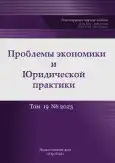Creating of Trans-border Territories as a New form of the International Relationships
- Autores: Loy D.K.1, Turgel I.D.1
-
Afiliações:
- Ural Federal University named after the first President of Russia B.N. Yeltsin (UrFU)
- Edição: Volume 19, Nº 6 (2023)
- Páginas: 202-207
- Seção: Regional and Sectoral Economics
- URL: https://journal-vniispk.ru/2541-8025/article/view/252479
- EDN: https://elibrary.ru/SJROOQ
- ID: 252479
Citar
Resumo
The Purpose of research. The article examines cross-border relations and forms special status of territory formation, as ways of their state regulation, taking into the ways of their development and problems of interstate cooperation. The author conducted a study of economic and political processes, identified the interrelationships and specifics, considered the political and economic components. The purpose of the work is research the possibility of creating new formats of international relations and to assess the possibility of creating trans-border territories with a special regime, their administration and regulation. To achieve the purpose of the study, the tasks were set to study the Russian and foreign experience in regulating relations exclude territories outside the jurisdiction of the state; to study the prerequisites for the creation of trans-border territories, with a special procedure for regulating relations on them; to determine political and economic approaches and principles that allow creating cross-border territories and implementing their effective regulation.
Results. In the course of the study, the author came to the conclusion that in order to build effective cross-border relations, their regulation should be based not only on the economic benefits for specific international projects, but also on political effects, for the assessment of which not only state bodies belonging to the economic block are involved, but also bodies forming policies in the field of international cooperation, to create the possibility of more flexible functioning and interaction. In addition, it is necessary to involve in their management not only federal authorities, but also state authorities of the subjects of the Russian Federation, as well as local governments within their powers. At the same time, direct operational management should be carried out within the border zone itself, and the authorities of all participants in border relations should exercise supervisory functions, build a strategy and calculate the economic effect.
Texto integral
##article.viewOnOriginalSite##Sobre autores
Dmitry Loy
Ural Federal University named after the first President of Russia B.N. Yeltsin (UrFU)
Email: loy_d@mail.ru
postgraduate student, MBA
Rússia, YekaterinburgIrina Turgel
Ural Federal University named after the first President of Russia B.N. Yeltsin (UrFU)
Autor responsável pela correspondência
Email: i.d.turgel@urfu.ru
Dr. Sci. (Econ.), Professor, Head of Chair of the Department for Theory, Methodology and Law Support of State and Municipal Administration, Head of School of Economics and Management
Rússia, YekaterinburgBibliografia
- Bell, T.W. Special Economic Zones in the United States: From Colonial Charters, to Foreign-Trade Zones, Toward USSEZs, Buffalo Law Review, 2016, № 5, vol. 64.
- Akcigit U., Pearce J.G., Prato M. Tapping into Talent: Coupling Education and Innovation Policies for Economic Growth, 2020, working paper.
- Sheng Cai, Wei Xiang Multinational Production, Technology Diffusion and Economic Growth, Job Market Paper, 2022.
- Decree of the Government of the Russian Federation No. 196-r dated 09.02.2001 «On Approval of the Concept of Cross-border Cooperation in the Russian Federation», Collection of Legislation of the Russian Federation, 19.02.2001, No. 8, Article 764.
- European Framework Convention on Cross-Border Cooperation of Territorial Communities and Authorities (ETS No. 106), Bulletin of International Treaties, 2003, No. 10, pp. 3–120.
- Federal Law No. 179-FZ dated 07/26/2017 «On the Basics of Cross-border Cooperation», Rossiyskaya Gazeta, No. 167, 07/31/2017.
- Decree of the Government of the Russian Federation dated 07.10.2020 No. 2577-r «On approval of the Concept of cross-border cooperation in the Russian Federation», Collection of Legislation of the Russian Federation, 19.10.2020, No. 42 (Part III), art. 6650.
Arquivos suplementares








